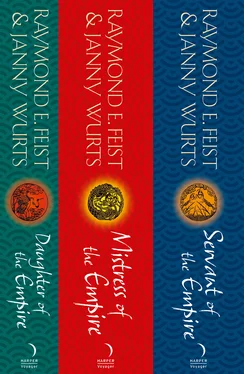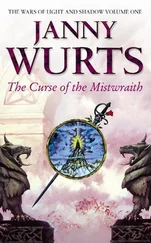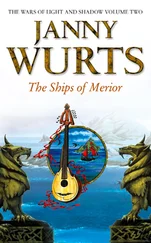The drums boomed and fell silent. Mara raised her voice to open the ceremonies. ‘We are gathered to commemorate the life deeds of Papewaio, son of Papendaio, grandson of Kelsai. Let all present know that he achieved the rank of First Strike Leader of the Acoma, and that the honours that earned him this postion were many.’
Mara paused and faced east; and the small gap left in the circle was now filled by a white-robed priest of Chochocan, who wore armlets woven of thyza reed, and whose presence symbolized life. The Lady of the Acoma bowed in deference to the god, then began to recite the memorable deeds of Papewaio’s service, from the first day of his oath to the Acoma natami. As she spoke, the priest shed his mantle. Naked but for his symbols of office, he danced in celebration of the strong, brave warrior who lay in state upon the bier.
The list of Papewaio’s honours was a lengthy one. Well before the recitation ended, Mara had to struggle to keep her composure. Yet as her account faltered, the guests did not fidget or show boredom. Life and death, and the winning of glory according to the code of honour, were a subject central to the Tsurani civilization; the deeds of this particular servant of the Acoma were impressive. Rivalry, hatred, even blood feud did not extend past the borders of death, and so long as the priest danced in remembrance of Papewaio, the Lord of the Minwanabi and every distinguished guest acknowledged the renown of the deceased.
But no warrior’s prowess could accomplish immortality. Eventually Mara reached the night when the blade of a thief had ended a brilliant career. The dancer bowed to the earth before the bier, and the Lady of the Acoma turned west, where a red-robed priest stood in the small gap in the circle. She bowed in respect to the representative of the Red God; and the priest in service to the Death God threw off his mantle.
He was masked with a red skull, for no mortal might know the face of death until his turn came to greet the Red God, Turakamu. The priest’s skin was dyed scarlet, and his armlets were woven of serpent skins. Again Mara raised her voice. She managed the last with flawless poise, for her life now balanced upon her ability to play the Great Game. In ringing tones she described the death of a warrior. And with true Tsurani appreciation of theatre and ceremony, she made her account an accolade to the honour of Papewaio.
The priest of Turakamu danced a warrior’s death, with bravery, glory, and honour that live on in memory. When he finished, he drew a black knife and slashed the scarlet cords that bound Papewaio’s wrists. The time for flesh was ended, and the spirit must be freed from its bondage to death.
Mara swallowed, her eyes dry and hard. From the priest of Turakamu she accepted the flaming torch that burned at the foot of the bier. This she raised skyward, with a silent prayer to Lashima. Now she must name Papewaio’s successor, the man who would assume his former duties so that his spirit would be free of mortal obligation. Saddened, Mara strode to the head of the bier. With trembling fingers she fixed the red reed to the warrior’s helm. Then she plucked away the officer’s plume, and turned to face the still ranks of the Acoma soldiers who closed the north end of the circle.
‘Arakasi,’ she said; and though her summons was barely above a whisper, the Spy Master heard.
He stepped forward and bowed.
‘I pray to the gods I have chosen wisely,’ Mara murmured as she gave the torch and the plume into his hands.
Arakasi straightened and regarded her with dark, enigmatic eyes. Then, without comment, he turned and cried out for his companion at arms, Papewaio. The priest of Chochocan re-entered the circle with a reed cage that contained a white-plumed tirik bird, symbol of the spirit of rebirth. As the flames touched the kindling stack beneath Papewaio’s muscled corpse, the priest slashed the reed constraints with a knife. And Mara watched, her eyes misted, as the white bird shot skyward and vanished into the rain.
Fire hissed and cracked, smoky in the dampness. The guests waited a respectful interval before they filed slowly back to the estate house. Mara remained, along with her fifty warriors and her newly chosen honour guard, waiting for the fire to burn out and the priests of Chochocan and Turakamu to gather Papewaio’s ashes. These would be enclosed within an urn and buried beneath the wall of the Acoma contemplation glade, to honour the fact that Papewaio had died in loyal service to the family. For a time, Mara was alone with Arakasi, away from the scrutiny of the guests.
‘You did not bring Nacoya with you,’ Arakasi murmured, his words barely audible over the snap of the pyre. ‘Mistress, that was clever.’
His choice of words pierced the lethargy left by grief. Mara turned her head slightly, studying the Spy Master to analyse the reason for the edge of sarcasm she had detected in his tone. ‘Nacoya is in the estate house, ill.’ Mara paused, waiting for a reply. When none came, she added, ‘We shall be joining her within the hour. Do you think you can keep us alive until evening?’ The remainder of the day had been set aside for contemplation and remembrance of Papewaio. But she referred to the fact that, once away from the bier, the guests would reassume the ongoing machinations of the game; and Arakasi, though competent, was not her most proficient swordsman.
The Spy Master accepted the implication with the barest indication of a smile. ‘Very wise, indeed, my Lady.’
And by his tone of relief, Mara understood. He had thought she intended to flee the Minwanabi, now, while she was reunited with her warriors. Nacoya would have agreed to remain behind towards this end, an intentional sacrifice to blind Minwanabi to her mistress’s intention to break and run for home. Mara swallowed, pained again by grief. How readily the old woman might have embraced such a ruse, her abandonment in an enemy house a gambit to ensure Acoma continuance.
‘Papewaio was sacrifice enough,’ Mara said, sharply enough for Arakasi to know that flight was the last of her intentions.
The Spy Master nodded fractionally. ‘Good. You would not have survived, in any event. Minwanabi has ringed his estates with his armies, with the appearance of safe-guarding the presence of his guests. But over their drink and their dice, his soldiers admit that many others without colours wait outside the estate borders, posing as pirates or roving bands of outlaws, to trap the Lady of the Acoma.’
Mara’s eyes widened. ‘And how did you know this? By borrowing an orange tunic and mingling with the enemy?’
Arakasi chuckled, very low in his throat. ‘Hardly that, my Lady. I have informants.’ He regarded his mistress, studying a face that was pale but for the faint flush lent by the heat of the fire. Her slight frame was straight, and her eyes afraid but determined. ‘Since we stay and confront the Lord of the Minwanabi, there are things you should know.’
Now Mara showed the slightest indication of triumph. ‘Loyal Arakasi. I chose you because I trusted you to hate the Lord of the Minwanabi as I do. We understand each other very well. Now tell me all you know that will help me to humble this man who murdered my family and a warrior who was most dear to my heart.’
‘He has a weak link in his household,’ Arakasi said without preamble. ‘A relli in his nest that he does not know about. I have discovered that Teani is an Anasati spy.’
Mara drew a startled breath. ‘Teani?’ She assessed this and suddenly felt more than the chill of the rain. All along, Nacoya had insisted that the concubine had been more dangerous than Mara credited; and Mara had not listened, a mistake that might have cost her everything she had struggled to gain, for here was a Minwanabi servant who had no concern should Mara’s death cost Jingu his life and honour. In fact, to arrange such a pass would no doubt please Tecuma, as it would avenge Buntokapi’s death and remove the man most likely to cause little Ayaki harm. Mara wasted no time on recriminations but at once began to calculate how this information might be used to her advantage. ‘What else do you know of Teani?’
Читать дальше












